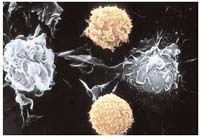Russian researchers to make cancer treatment happy end for more patients
American experts expect that cancer can be defeated by the year of 2017. And the optimistic forecast is quite probable as a huge number of discoveries, new methods and medicines, including targeted ones to exterminate some forms of cancer that could not be treated earlier, have appeared in the sphere of cancer treatment within the past years.

The Russian science has also progressed in cancer treatment. Moscow’s Gertsen Research Institute has recently published a research on comprehensive diagnostics of cancerous growths. Researchers made an attempt to answer why malignant growths of the same type, size and clinical stage behave in a different way with different patients. Treatment that is good for some patients may be of no effect for others. Besides a patient’s host defenses, there are some factors that influence the effect of medicines.
Head of the Institute’s pathologic anatomy division, Corresponding Member of the Russian Academy of Medical Sciences Georgy Frank says that these factors are in the focus of the Institute’s study. Each growth has a number of variations. With some patients it can be more aggressive and produces many metastases while with other patients nothing of the kind is registered. In some cases a growth can be susceptible to hormones but with other patients hormones have no effect upon cancerous growths. In the past years, it was quite enough to diagnose that a patient had breast cancer. Today, it is necessary to specify it in a more detailed way.
The Institute has studied the molecular level of conditions that provoke different characteristics of a cancerous growth. As it turned out, there are ferments that break the links between malignant cells thus allowing them to travel about the organism, settle in different parts of it and form metastases. At that, the presence of such ferments can be discovered when a swelling has not produced metastases yet.
A doctor who knows to what extent a swelling is malignant can easily decide whether to prescribe strong medicines or just remove a new growth. For the time being, there is a complex of indications that allows doctors to define the type of cancer that a patient has. This helps doctors choose a right method of treatment. Indeed, it is no use prescribing hormonal therapy to a patient if it is clear that such medicines will have no effect in his case. Before the study appeared hormonal therapy was obligatorily prescribed to all patients having cancer.
Making this individual diagnostics is possible thanks to delicate molecular and biological responses. They help define which chromosome has a damage that causes a malignant growth. Required results can be detected with the help of markers as genes and chromosomes are of a small size. Senior research fellow of the Institute Larissa Zavalishina conducted the study with markers. She says that the capsule of a cell has receptors that identify substances a cell needs and let them inside. This is some kind of a lock which can be opened with a special molecule only.
A mutant gene breaks the barrier and bad substances get into a cell including a growth factor that provokes continuous cell fission. So, a swelling grows. Instead of four receptors on its surface, a cell gets from forty to sixty receptors. If proved that an increasing number of these structures absorb a medicine meant to destroy them, this medicine will repress further growth of a swelling. These reactions can be seen through a microscope: if a cell contains sectors that coincide with a marker introduced into it, the marker will glow.
Main goal of the Institute’s research is to study all characteristics and nuances of a swelling to introduce more clarity into treatment methods and be able choose an optimum alternative. A tumor process is highly individual with every patient that in its turn requires individual treatment. It is known that not all patients can be prescribed expensive chemotherapy which also has a number of side effects that are bad for the organism. Methods developed by the Institute will help doctors avoid mistakes in cancer treatment.
Arguments and Facts
Translated by Marua Gousseva
Pravda.ru
Subscribe to Pravda.Ru Telegram channel, Facebook, RSS!




